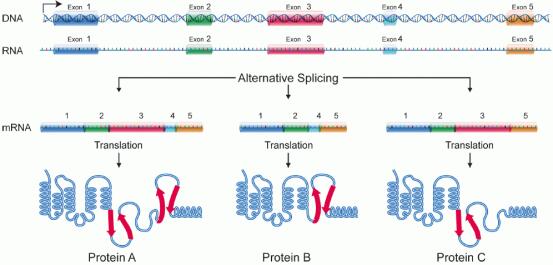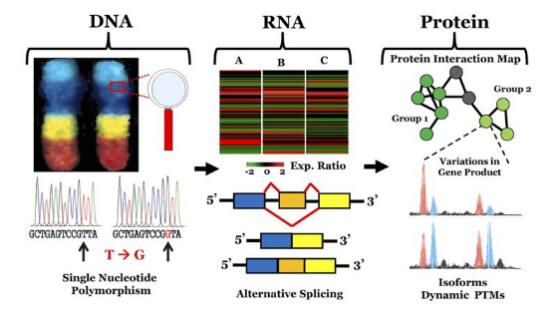Protein Isoform Detection Service
What is Protein Isoform?
A protein isoform, or "protein variant", is a member of a set of highly similar proteins that originate from a single gene or gene family and are the result of genetic differences. While many perform the same or similar biological roles, some isoforms have unique functions. A set of protein isoforms may be formed from alternative splicings, variable promoter usage, or other post-transcriptional modifications of a single gene; post-translational modifications are generally not considered. Through RNA splicing mechanisms, mRNA has the ability to select different protein-coding segments (exons) of a gene, or even different parts of exons from RNA to form different mRNA sequences. Each unique sequence produces a specific form of a protein.
The discovery of isoforms could explain the discrepancy between the small number of protein-coding regions genes revealed by the human genome project and the large diversity of proteins seen in an organism: different proteins encoded by the same gene could increase the diversity of the proteome. Isoforms at the RNA level are readily characterized by cDNA transcript studies. Many human genes possess confirmed alternative splicing isoforms. It has been estimated that ~100,000 expressed sequence tags (ESTs) can be identified in humans. Isoforms at the protein level can manifest in the deletion of whole domains or shorter loops, usually located on the surface of the protein.

Necessity and importance of protein isoforms analysis
Protein isoforms or protein variants are members of a group of highly similar proteins that may appear due to other splicing, polymorphisms, and post-translational modifications (PTM). Although protein isoforms can be derived from separate genes, each protein isoform has multiple biological roles. It has been shown that protein isoforms play an important role in various biological processes. For example, specific protein isoforms can affect thyroid pathology, which involves various types of cancer, cardiac hypertrophy, autoimmune diseases, and diabetes. In this way, protein isoforms have been used as biomarkers or therapeutic targets. Therefore, it is essential to develop effective methods to identify and quantify specific protein isoforms.

Protein Isoform Analysis Service
With years of solid experience and unique expertise in customized protein services, Leading Biology has developed several novel protein isoform analysis methods that provide accuracy and reliability for protein isoform differentiation. These methods are based on mass spectrometry (MS), which has been widely used in protein analysis, such as bottom-up and top-down platforms. Through a bottom-up platform, proteins are digested into peptide fragments by enzymes before mass spectrometry identification. Mass spectrometry is performed on intact proteins, ie from top to bottom.
In addition to the above methods, we are also professional in other advanced approaches for protein isoforms analysis, including:
Electrospray ionization (ESI)
Hydrophobic interaction chromatography (HIC)
Two-dimensional difference gel electrophoresis (2-D DIGE)
Advantages of protein isoform analysis service
Using our various powerful methods, Leading Biology can provide protein identification services with far higher reliability and confidence, and also directly characterize amino acid sequence errors and variations. We can analyze the intact proteins from low-mass proteome (5-25 kDa) to 229 kDa in protein size. More importantly, our targeted mass spectrometry-based methods can be used as antibody free validation tools as well as used as potential tools to selectively analyze specific protein isoforms.
For more detailed information, please feel free to contact us at info@leadingbiology.com or directly send us an inquiry.
| No | Headline | Click | Author | Date |
| 1 | Ubiquitination | 1489 | Leading Biology | 2020-06-24 |
| 2 | Acetylation | 1048 | Leading Biology | 2020-06-23 |
| 3 | Single Molecule Protein Detection | 1289 | Leading Biology | 2020-06-22 |
| 4 | Phosphorylation | 1288 | Leading Biology | 2020-06-22 |
| 5 | Methylation | 1482 | Leading Biology | 2020-06-22 |
| 6 | Protein Detection and Immunoassay | 1429 | Leading Biology | 2020-06-17 |